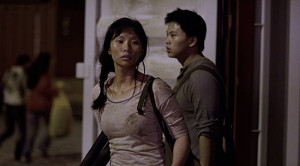Livi Zheng Revels in the Role of Pain-in-the-Ass Director

Indonesian-born 20-something stuntwoman Livi Zheng co-wrote, directed and starred in Brush with Danger. The thriller is the story of a brother (Ken Zheng) and sister (Livi Zheng) who immigrate illegally to the United States and start living on the streets of Seattle. He’s a martial arts fighter and she’s an artist whose wits are tested when they find themselves involved with a shady art dealer. Zheng phoned to discuss the movie, which was shot over a mere 27 days.
How’d you come up with the concept for the film?
I have liked to do all kinds of different martial arts since I was young. I also was interested in working in the film industry. When I was 15, I started doing stunts. Then, two years later, I moved to Seattle for an undergraduate degree. In terms of the inspiration for the idea, my good friend is from Ethiopia and he ran away from real wars. He was here by himself and had no citizenship; he wasn’t American or Ethiopian. His experience was really tough and really inspiring.
To what extent do you channel your personal experiences into the movie?
When my brother was in elementary school, it was just the two of us in China and we didn’t speak the language at all. It’s not exactly like my life but it kind of reflects my life. My character is a little like my relationship with my brother in real life.
This is an action-filled indie film. Talk about the challenges of doing the choreography and fight scenes.
We luckily have a really good stunt coordinator. He’s done stunts for Blue Velvet, Northern Exposure and Drugstore Cowboy. He was on board early, even before I had a script. We worked together. My brother is on the national team for martial arts. The fighting wasn’t so hard, but the drama was hard. Because my brother and I wrote it, it’s not exactly how an American would say things. We kept trying to memorize the right version of it but it just didn’t work. It was so weird.
What originally made you want to act?
It’s not like I specifically want to be an actress. I like to do stunts. I did wire work when I was younger. When you’re an actor, you get better roles than you get as a stunt person. I’m in love with doing stunts. But for career purposes, if you can act, you can get better pay and opportunities.
And how did your interest in directing develop?
That was interesting. I don’t tell this story to too many people. When I came to the U.S., I always wanted to produce. I was going to produce a film. We wanted to find a director that we would all like. The director we really wanted was doing another project. My producer thought I should direct it. They supported me. I wanted them to co-direct but they didn’t want to. I called my dad and he said, “Are you crazy? Take the job.” I thought about it and just decided to do it. I fell into it and I liked it. Being a director is kind of nice. When you’re a producer, you have to deal with the pain-in-the-ass director. This way, I get to be the pain in the ass. I like it but I still have a lot to learn. I think I’m improving little by little.
Was this film really shot in 27 days?
Yeah. It was 27 days. A lot of people helped me with favors. We had four or five Emmy Award winners and Oscar-nominated people. We did heavy rehearsing and shot it really fast because those people couldn’t take off for two months.
What was it like shooting in Seattle?
We shot the interior of the house in L.A. but everything else was in Seattle. Seattle Film is very friendly. They would help me out and helped me personally. In some cities, it’s hard to meet the right people. They coordinated with the police and we got all our questions answered. The permit was really cheap too. The whole film was $550 for all our permits for 27 days.
Could be it set in any American city?
It could be set in any city but Seattle is very beautiful. And we knew a lot of people.
There’s large Asian communities there too.
There’s a lot of Asian immigrants and illegal immigrants there.
What’s the response to the film been like?
A lot of people in forties really like the film. The people who cut my trailer–they’ve done trailers for Harry Potter—I asked them about the demographic. They thought the demographic was a 40-year-old female. I think that’s true.
But I would think teenagers and people in their twenties would like it.
That’s what I thought too but somehow it appeals to an older woman.
I think it’s great you do martial arts. I feel like there aren’t that many women in film doing martial arts.
You’re right. For these films, I used a stunt coordinator who’s Asian and he told me to brand myself as a female action director because there’s no one who does that, even in Asia. I never thought of it that way but it’s a cool thing.










